Supporting Children Through Divorce
A Sample Divorce Decree Without Children: A Comprehensive Guide
Leverage this comprehensive guide to unravel the complexities of a divorce decree without children and gain clarity on essential legal aspects.
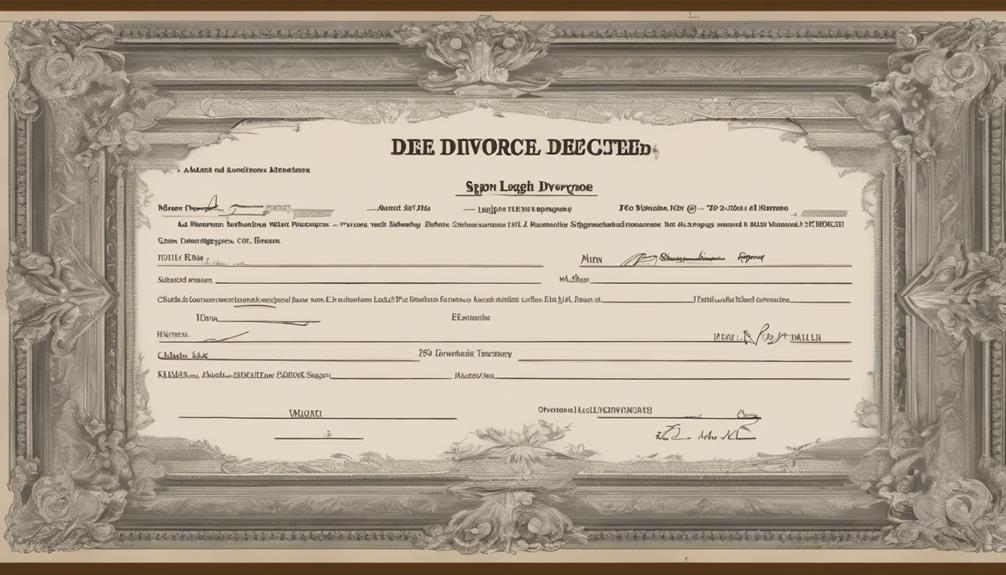
In the United States, did you know that approximately 45% of marriages end in divorce? It is important to understand the details of a divorce decree to successfully navigate through this complex process.
In this guide, we break down the essential components of a divorce decree for cases without children, providing a comprehensive overview of the legal requirements and steps involved.
Whether you're considering a divorce or already in the midst of one, this guide offers valuable insights to help you navigate this significant life transition with clarity and confidence.
Key Takeaways
- Complete required forms accurately for a finalized divorce decree.
- Understand legal terms like alimony, equitable distribution, and custody.
- Draft decree with details on property division, support agreements, and name changes.
- Use testimonies and affidavits to support claims and decisions in the decree.
Required Documentation for Divorce Decree
In preparing the required documentation for a divorce decree, we must ensure that all necessary forms are accurately completed and signed by both spouses. The Final Decree, signed by the judge, is a pivotal document in formalizing the dissolution of the marriage.
Alongside this decree, supporting documents like the marital settlement agreement, parenting plan (if applicable), and financial disclosures play a crucial role in outlining the agreed terms and arrangements between the parties. Additionally, proof of service of process is essential to demonstrate that both spouses have been properly notified of the divorce proceedings.
Including any other relevant court filings further strengthens the completeness of the divorce decree documentation. Both spouses' signatures on the decree signify their acknowledgment and acceptance of the terms therein, facilitating a smoother finalization of the divorce process.
Attention to detail and accuracy in compiling these documents are paramount to ensure a comprehensive and legally sound divorce decree.
Understanding Legal Terms in Decree
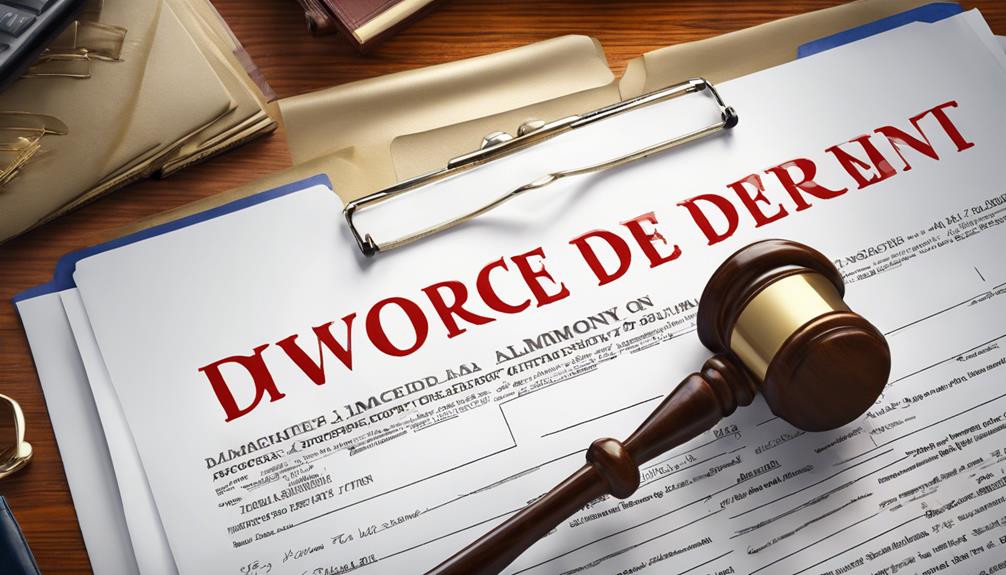
Navigating the intricate web of legal terms within a divorce decree can be a daunting task for many individuals. When drafting your decree, it's crucial to grasp terms like 'Petitioner' and 'Respondent,' distinguishing the filing spouse from the other.
Understanding 'community property' (assets acquired during marriage) and 'separate property' (assets owned pre-marriage) helps clarify asset division. Additionally, terms like 'alimony' or 'spousal support' outline post-divorce financial responsibilities. 'Equitable distribution' ensures a fair split of assets and debts.
For couples without children, terms like 'custody,' 'visitation,' and 'child support' are pivotal even if not applicable. Seeking legal advice can aid in deciphering these terms and ensuring your decree aligns with the court order.
Steps to Drafting Your Decree
Transitioning from understanding legal terms in your decree, we now move on to the essential steps involved in drafting your divorce decree.
When drafting your decree, it's crucial to consider the court's requirements and ensure that all necessary details are included. Start by clearly outlining the division of property, including real estate, vehicles, and financial accounts.
Be specific about any agreements regarding spousal support or alimony, making sure to detail the duration and amount to be paid. Additionally, address debt allocation between both parties, whether it pertains to credit card debt or loans.
It's important to specify any desired name changes post-divorce and include provisions for other relevant matters like retirement account division or changes in insurance coverage. By carefully documenting these aspects, you can create a comprehensive decree that meets legal standards and ensures a smooth transition for both parties.
Testimonies and Affidavits in Divorce
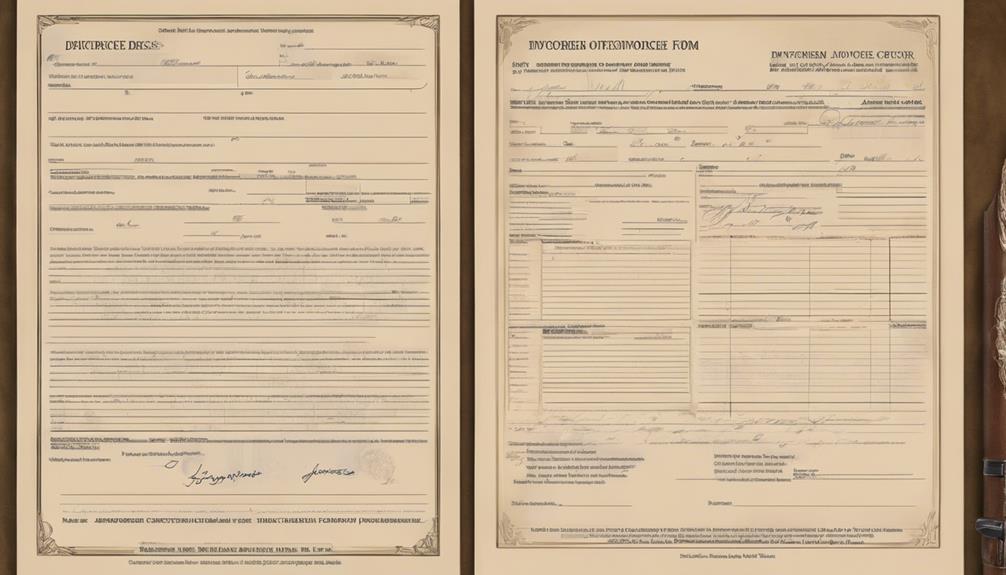
Testifying under oath and providing written affidavits play crucial roles in divorce proceedings, serving as vital tools to substantiate claims and establish facts. Testimonies in divorce cases are firsthand accounts given under oath, offering insight into the circumstances surrounding the divorce. Affidavits, on the other hand, are sworn statements put in writing, providing a documented record of facts relevant to the case. These testimonies and affidavits help to validate allegations, clarify information, and support decisions within the divorce decree. By ensuring that all testimonies and affidavits are truthful, accurate, and pertinent to the case, the integrity of the divorce process is upheld, leading to a fair and just resolution. Witnessing the emotional weight of these testimonies and affidavits can be challenging, yet they are essential components in navigating the complexities of divorce proceedings.
| Testimonies | Affidavits | Divorce |
|---|---|---|
| Firsthand accounts given under oath | Sworn statements put in writing | Vital tools in divorce proceedings |
Post-Divorce Name Change Order
After finalizing a divorce, individuals may seek a post-divorce name change order to legally change their name. This order can be crucial in helping individuals transition smoothly into their new lives.
Here are three essential points to consider when navigating a post-divorce name change order:
- Legal Services: Seek guidance from legal professionals or services specializing in family law to ensure the name change process complies with the legal requirements set forth by the Supreme Court and the Texas Family Code.
- Court Approval: The name change order must be approved by the court to be legally binding. It's vital to follow all the specific procedures and requirements outlined by the court to facilitate a successful name change.
- Updating Identification Documents: Once the name change order is granted, individuals can utilize it to update crucial identification documents like driver's licenses, passports, and social security cards to reflect their new legal name accurately. This step is essential for maintaining consistency and authenticity in personal identification.
Frequently Asked Questions
How Do You Get Over a Messy Divorce?
We heal from a messy divorce by seeking therapy, practicing self-care, and leaning on a supportive network. Engage in activities that bring joy and focus on personal growth. Remember, we're in this together.
How Do You Gracefully Divorce?
Navigating divorce gracefully is like dancing through a storm; it requires communication, empathy, and compromise. Seek mediation, consider fairness, and create a detailed agreement together. Approach the process with compassion and focus on positive growth.
How Do You Make a Divorce Difficult?
We create a difficult divorce by prolonging conflicts, refusing cooperation, hiding assets, manipulating emotions, or using children as pawns. Our actions can escalate tensions and complicate the process. Instead, open communication and cooperation can lead to a smoother resolution.
How Do You Accept Divorce When You Don't Want It?
Accepting divorce when we don't want it can be tough. We must acknowledge our feelings, seek support, focus on self-care, explore new joys, and connect with others who understand. It's a journey we navigate together.
How can I modify a divorce decree template for children to fit my specific situation without children?
If you don’t have children and need to modify a free divorce decree template, simply remove all sections related to child custody, visitation, and support. You may also need to adjust any language pertaining to children’s needs or well-being. Review the template carefully to ensure it reflects your specific situation.
Conclusion
In navigating the complexities of divorce without children, remember that you aren't alone in this journey. Through proper documentation, understanding legal terms, drafting your decree, providing testimonies, and seeking a name change order, you can move forward with confidence.
Like a river flowing steadily towards the sea, trust that you have the strength and support to navigate this process and emerge stronger on the other side.
Stay resilient, stay informed, and remember that brighter days lie ahead.
Sarah’s voice is one of the first you’ll encounter at How Get Divorce, and it’s one you’ll come to trust. As a writer, she brings relatability and approachability to complex topics, making them understandable for everyone. As our Community Moderator, Sarah fosters a welcoming and supportive environment, encouraging open dialogue and connection among our members. Her ability to relate to others and moderate discussions makes her an integral part of our team and community.
Supporting Children Through Divorce
Top Children's Books About Divorce: A Guide for Parents
Tackle tough topics with the best children's books about divorce, helping kids navigate emotions and changes in a way that is relatable and comforting.
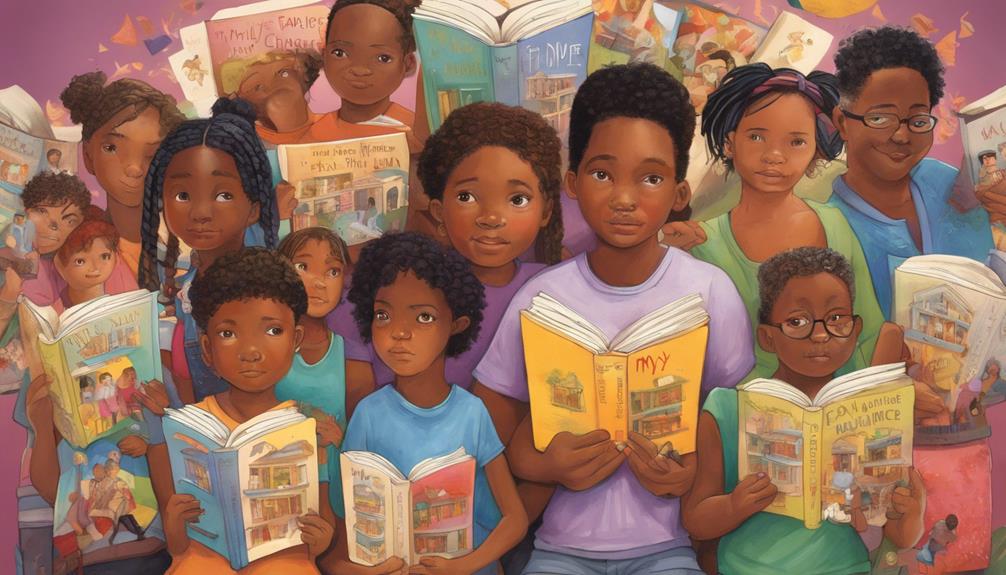
Selecting the right children’s books on the topic of divorce is essential for helping kids comprehend the intricacies of family changes.
These books offer a unique way for kids to explore their feelings and find comfort during challenging times.
By providing relatable stories and fostering emotional intelligence, these resources can be invaluable for parents seeking to support their children through the ups and downs of the divorce process.
Key Takeaways
- Choose age-appropriate books with relatable characters for emotional support.
- Use storytelling to address complex emotions and foster empathy.
- Help children build resilience and understanding through diverse family narratives.
- Support your child's emotional journey by providing insights and relatable content.
Importance of Children's Books About Divorce
Exploring the significance of children's books about divorce reveals their essential role in guiding young minds through the complexities of family changes and emotions. Books on divorce serve as companions for children, helping them navigate the turbulent waters of parental separation. These stories not only provide comfort but also offer valuable insights into understanding and processing the multitude of emotions that come with such transitions. Through relatable characters and engaging narratives, these books help children understand that they aren't alone in their experiences.
Parents play a crucial role in introducing these books to their children. By reading these stories together, parents can initiate important conversations about divorce, emotions, and coping mechanisms. Good stories about divorce not only entertain but also educate, instilling empathy and emotional intelligence in children. Ultimately, children's books about divorce serve as powerful tools in fostering resilience and promoting mental well-being during challenging times.
Choosing the Right Book for Your Child
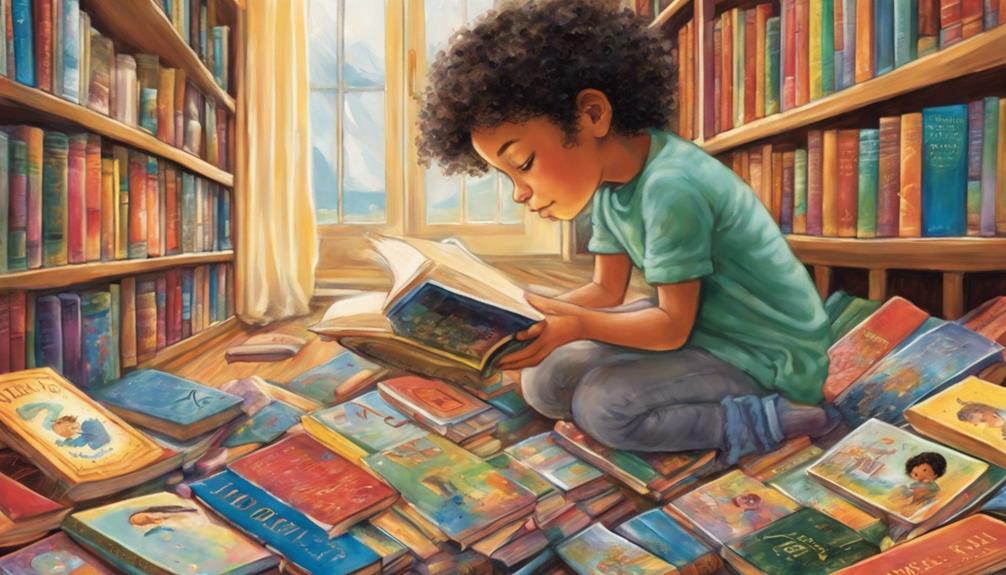
As parents facing the challenges of helping our children navigate divorce, it's crucial to carefully select a children's book that resonates with our child's age, emotions, and unique family dynamics. When choosing the right book for your child, consider the following:
- Age-Appropriate Explanations: Look for books that provide clear and simple explanations about divorce that are suitable for your child's age group.
- Relatable Characters: Seek out books with characters that your child can connect with and see themselves in, making the story more engaging and relatable.
- Emotional Maturity: Consider the emotional maturity of your child and choose a book that addresses divorce in a way that they can understand and process.
- Family in Their Titles: Books with 'family' in their titles often focus on themes of family dynamics, making them potentially helpful in discussions about divorce.
- Professional Recommendations: Don't hesitate to ask for recommendations from professionals like educators or counselors who can point you towards books that best suit your child's needs.
Addressing Emotions Through Storytelling
Children's books about divorce serve as a powerful tool for helping young readers navigate complex emotions and situations in a relatable and understandable manner. Through storytelling, children can explore feelings of confusion, fear, and sadness, finding comfort and guidance within engaging narratives.
The characters in these books often model resilience, empathy, and coping strategies, offering valuable lessons to children experiencing similar emotions. Illustrations play a crucial role in conveying these emotions effectively, enhancing the storytelling experience and helping children connect deeply with the content.
Building Resilience and Understanding
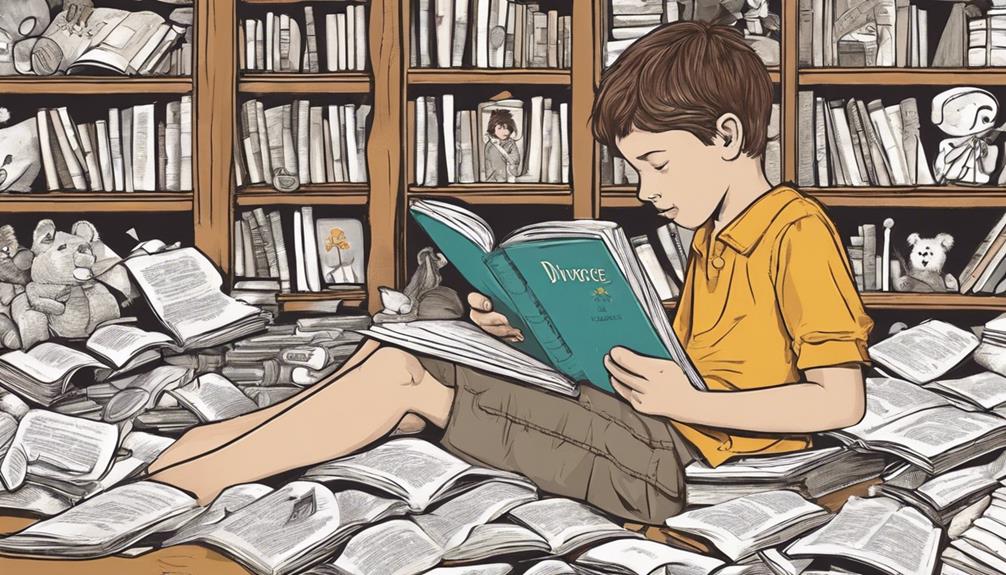
In understanding the complexities of divorce, children's books play a crucial role in nurturing resilience and fostering emotional intelligence.
- Children's books provide a safe space for exploring emotions and processing changes related to divorce.
- Through literature, kids can develop empathy towards others experiencing similar family transitions.
- Diverse representation in children's books reflects various family structures, promoting resilience and understanding.
- Reading about divorce in a relatable and age-appropriate manner helps children realize they aren't alone in their feelings.
- Literature equips children with coping skills to navigate the impacts of divorce positively, encouraging adaptability and emotional growth.
Supporting Your Child's Emotional Journey
Navigating your child's emotional journey through divorce can be aided by the insightful narratives found in children's books on the topic. These books delve into the complexities of parents' separation in a way that children can comprehend, offering relatable characters and storylines that resonate with their experiences.
The illustrations in children's books play a vital role in conveying emotions effectively, helping young readers process and understand their feelings during this challenging time.
Frequently Asked Questions
At What Age Is a Child Most Affected by Divorce?
We believe children between 6 and 8 are often most affected by divorce, grappling with guilt, blame, and confusion. Research suggests this age group may struggle with behavior changes and academic performance post-divorce. Support is crucial.
How Do You Help a Child Whose Parents Are Divorcing?
We help children whose parents are divorcing by providing reassurance, love, and open communication. We maintain stability, explain simply, and ensure the child knows it's not their fault. Together, we guide them towards resilience.
How Can I Help My Grown Child Through Divorce?
We can offer emotional support, encourage counseling, respect boundaries, help with legal matters, and promote self-care for our grown child going through divorce. Our presence and understanding can make a significant difference in their journey.
What Not to Say to Kids During Divorce?
During divorce, we should avoid saying hurtful things to kids. Let's not blame or involve them in adult matters. Instead, let's reassure them, listen to their feelings, and provide love and stability through this tough time.
Conclusion
As we close the chapter on selecting children's books about divorce, we find ourselves reflecting on the power of storytelling to guide our little ones through challenging times.
Just like characters in a book finding strength and resilience, may your child also navigate this journey with courage and understanding.
Remember, these stories are more than just words on a page – they're beacons of hope and comfort, guiding us through the ups and downs of life's unpredictable narrative.
Sarah’s voice is one of the first you’ll encounter at How Get Divorce, and it’s one you’ll come to trust. As a writer, she brings relatability and approachability to complex topics, making them understandable for everyone. As our Community Moderator, Sarah fosters a welcoming and supportive environment, encouraging open dialogue and connection among our members. Her ability to relate to others and moderate discussions makes her an integral part of our team and community.
Supporting Children Through Divorce
7 Must-Watch Movies About Children of Divorce
Explore the poignant tales of children navigating divorce in these cinematic gems, capturing the complexities of emotions and resilience with a twist that will leave you wanting more.
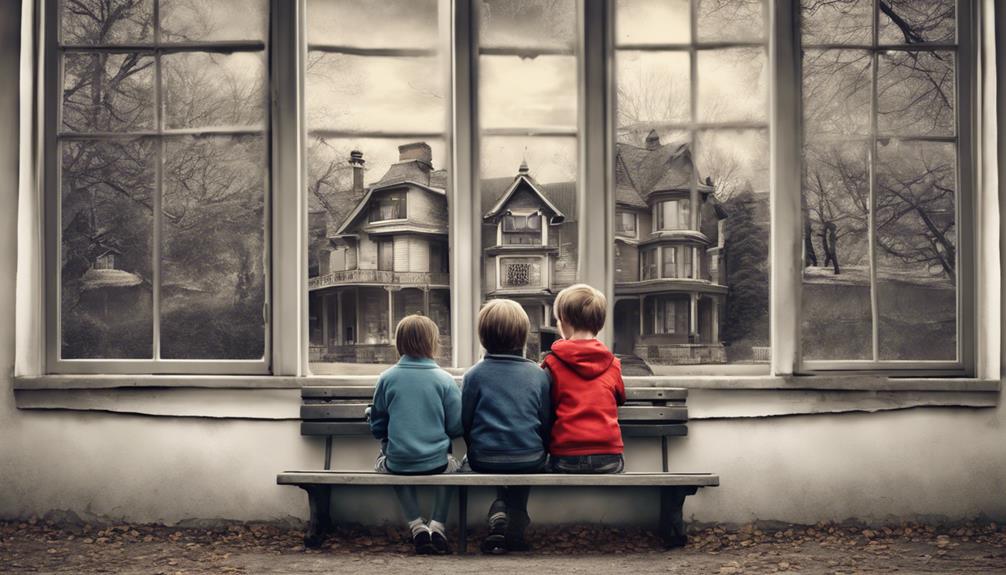
While researching recent films, we came across a selection of movies that shed light on the experiences of children navigating the difficulties of divorce.
These cinematic portrayals offer a glimpse into the emotional turmoil, resilience, and growth that often accompany such family transitions. Each movie presents a unique perspective on the challenges faced by children of divorce, showcasing their journey towards understanding, healing, and finding their place amidst changing circumstances.
Why not explore these compelling narratives and uncover the profound insights they hold for both viewers and those touched by similar circumstances?
Key Takeaways
- Cinematic portrayals highlight children's resilience and healing post-divorce.
- Positive family dynamics in films showcase thriving blended families after divorce.
- On-screen characters demonstrate resilience, growth, and adaptation in challenging family situations.
- Movies provide emotional exploration, support, and healing pathways for children of divorce.
Impactful Portrayals of Divorce in Cinema
In cinema, portrayals of divorce can deeply resonate with audiences, shedding light on the emotional complexities and challenges faced by families navigating the aftermath of separation. Films like 'Kramer vs. Kramer' poignantly capture the impact of parents' divorce on kids, showcasing the struggle of balancing custody and maintaining a sense of normalcy amidst turmoil.
The raw emotions portrayed in 'The Parent Trap (1998)' reflect the longing of children to see their parents reunited, highlighting the yearning for a cohesive family unit despite the challenges of divorce. These movies beautifully illustrate the resilience of children caught in the midst of their parents' divorce, emphasizing the importance of understanding and support during such turbulent times.
Family Dynamics in Film

Exploring the intricacies of family bonds through the lens of cinema reveals the resilience and unity that can emerge post-divorce.
In films like 'Despicable Me 2' and 'Mrs. Doubtfire,' we witness positive family dynamics after parents' divorce, emphasizing the importance of building relationships and prioritizing family unity. These movies portray step-parent figures and highlight amicable post-divorce cooperation, making transitions easier for children.
By showcasing positive family priorities in movies like 'Mr. Popper's Penguins,' the focus shifts to love and familial relationships, offering a sense of hope and reassurance for families navigating divorce. Seeing these on-screen representations of supportive family dynamics post-divorce can be comforting and inspiring, reminding us that even in challenging times, families can come together, grow, and thrive.
The power of film lies in its ability to capture the beauty of resilience and unity within families, even amidst the complexities of divorce.
Resilience and Growth on Screen
Witnessing the resilience and growth of children in films portraying divorce showcases their ability to navigate challenges and discover inner strength. Movies about divorce often capture the journey of children as they face the complexities of their family dynamics. These films shed light on the emotional turmoil children experience and their remarkable capacity to adapt and thrive amidst adversity. Characters in these movies serve as powerful examples of resilience, demonstrating how children can learn, evolve, and find strength in the midst of difficult circumstances.
Through the lens of these stories, viewers witness the transformation of children as they overcome obstacles and develop coping mechanisms. These narratives not only highlight the struggles children of divorce face but also emphasize their inherent resilience and potential for growth. By showcasing the inner strength and courage of children in the face of divorce, these movies offer a poignant reminder of the human spirit's capacity to endure and flourish in the face of hardship.
Emotional Journeys of Children
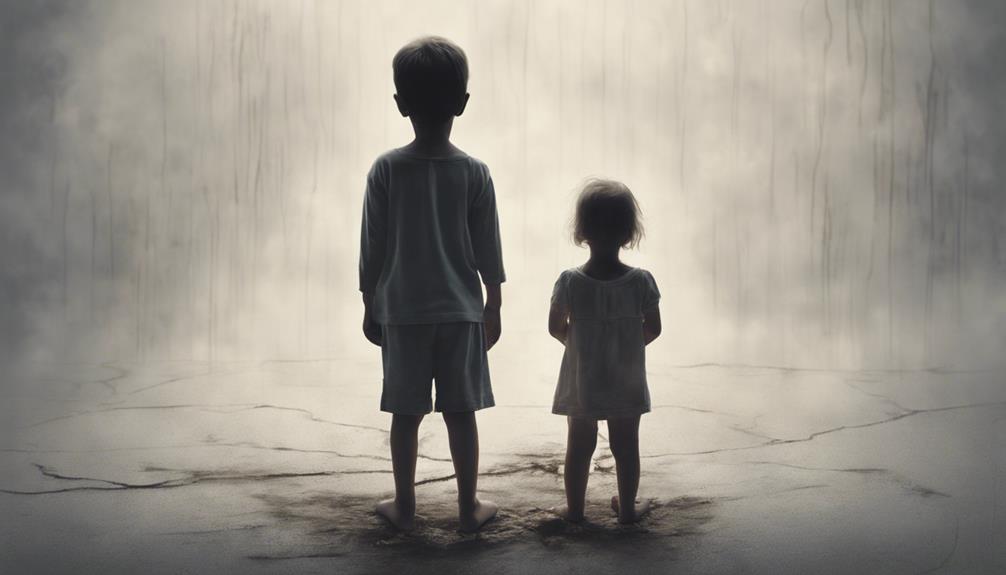
As children of divorce, we understand the rollercoaster of emotions that can come with family changes. Coping mechanisms and adapting to new family dynamics are essential parts of our emotional journeys.
It's okay to feel torn or conflicted between parents; finding support from loved ones can help us navigate these challenges with resilience.
Coping Mechanisms
Children of divorce often navigate a complex emotional landscape, where coping mechanisms play a crucial role in their journey towards healing and understanding. Each child's reaction to divorce is unique; some may find solace in expressing their feelings openly, while others might internalize their struggles. It's not uncommon for kids to mask their negative emotions to shield their parents or project strength.
Age also shapes how children cope, with different developmental stages presenting distinct challenges and coping strategies. For infants and toddlers, the changes in family dynamics post-divorce can lead to unhelpful beliefs or fears.
In movies like 'Parent Trap' and those featuring actors like Robin Williams, we witness varied coping mechanisms that mirror the real emotional complexities children of divorce face.
Family Dynamics
Navigating the intricate web of family dynamics post-divorce can be a challenging emotional journey for children, marked by feelings of guilt, confusion, and insecurity. Movies that depict the emotional struggles of children with divorced parents can offer insight into these complex family dynamics.
These films portray the adjustments children make to changes in relationships, routines, and living arrangements, highlighting the impact of divorce on their emotional well-being. Through these stories, viewers can witness the challenges children face in adapting to new family structures and roles, shedding light on the importance of understanding and addressing their emotional responses.
Healing Through Cinematic Narratives

Watching movies that depict the experiences of children of divorce can be a powerful catalyst for healing and understanding. As children and families navigate the complexities of divorce, cinematic narratives offer a unique avenue for emotional exploration and growth. Here are three ways in which movies can aid in the healing process:
- Validation of Feelings: Cinematic stories have the ability to validate the emotions experienced by children of divorce, reassuring them that what they feel is normal and understandable.
- Sense of Belonging: By watching characters on screen go through similar struggles, children may feel less alone in their own experiences, fostering a sense of connection and belonging.
- Opening Dialogue: Films can serve as a tool for divorced parents to initiate conversations with their children about divorce, helping to address questions and concerns in a safe and supportive environment.
Through the lens of cinema, children of divorce can find solace, empathy, and a pathway towards healing.
Love and Loss in Movie Stories
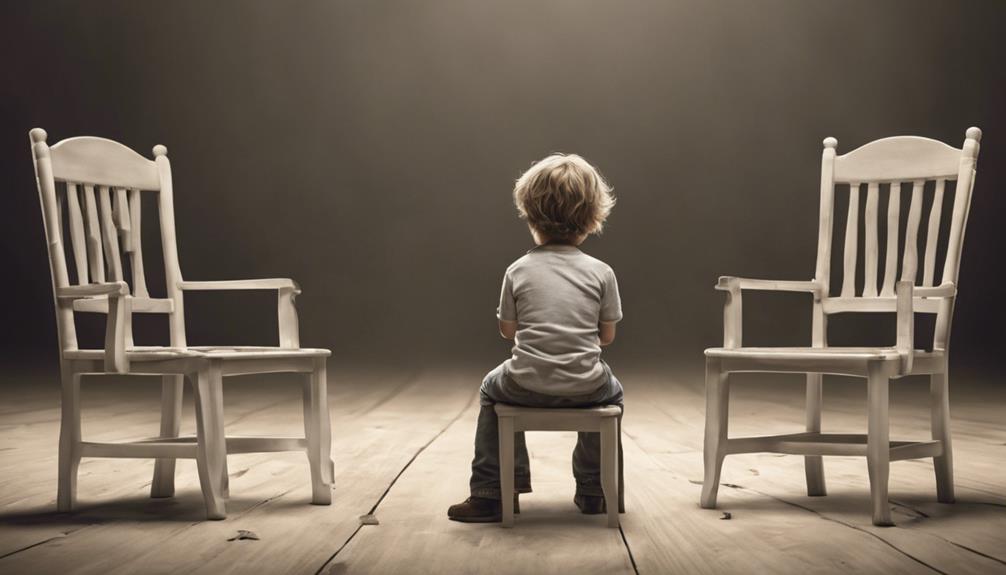
In exploring movie stories about children of divorce, we uncover poignant portrayals of love and loss amidst family challenges. These films delve into the intricate emotions experienced by children of divorced parents, showcasing their resilience in the face of adversity. Themes of love and loss are intricately woven into the narratives, illustrating how divorce impacts the relationships between children and their family members.
Characters in these movies navigate a rollercoaster of emotions, from initial confusion and heartache to eventual acceptance and personal growth.
Through the lens of these stories, viewers witness the profound effects of divorce on children's lives, shedding light on their struggles, coping mechanisms, and moments of strength. Love remains a constant thread in these narratives, portraying the enduring bonds that children share with their parents and siblings despite the challenges they face.
Loss, whether of the family unit as once known or of a sense of stability, is a central theme that resonates deeply with the experiences of children of divorce.
Insights Into Children's Experiences
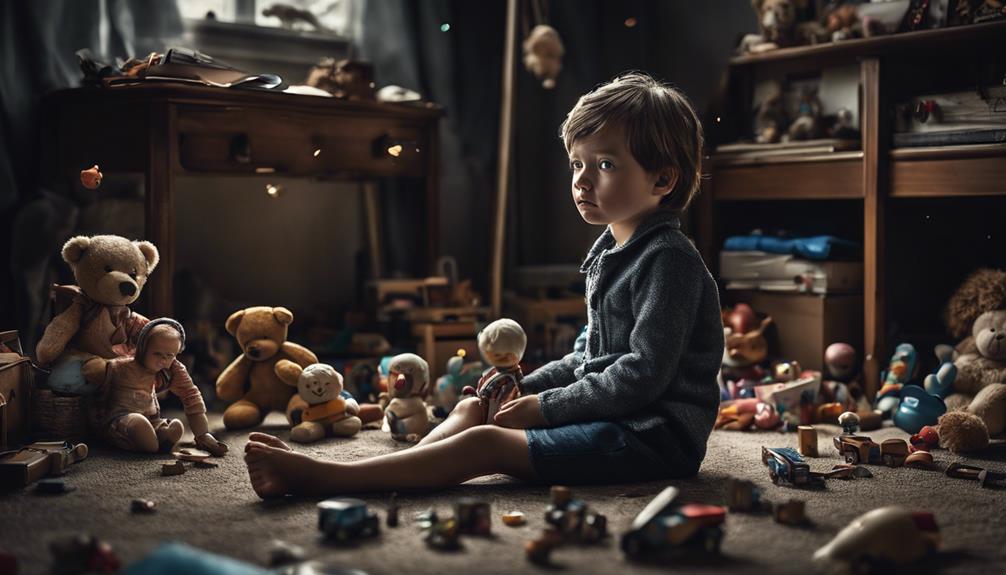
As we explore the emotional impact and coping mechanisms of children of divorce, it becomes evident that their feelings of guilt and uncertainty are common struggles.
Positive family memories can serve as a beacon of comfort amidst the chaos of change, offering a sense of stability.
Understanding the importance of addressing unresolved parental issues and providing context for shifting family dynamics is crucial in supporting these children through their coping process.
Emotional Impact
Understanding the emotional impact of divorce on children is crucial for fostering their well-being and helping them navigate this challenging experience. When a family is going through a divorce, children may experience a whirlwind of emotions that can be overwhelming. Here are three crucial insights into children's experiences during this tough time:
- Feelings of Guilt: Children often struggle with feelings of guilt, questioning if the divorce was their fault.
- Positive Memories as Comfort: Positive memories from the past can alleviate anxiety and provide comfort to children after a divorce.
- Parental Conflict Effects: Unresolved issues between parents post-divorce can negatively impact children's emotional well-being.
Navigating these emotions with empathy and understanding is essential for helping children cope with the changes brought about by their divorced father.
Coping Mechanisms
Children of divorce often develop unique coping mechanisms to navigate the emotional challenges and changes within their family dynamic. Kids and families impacted by divorce may exhibit behaviors such as masking negative emotions or blaming themselves for the situation.
It's essential for parents to understand that age influences how children cope; infants may form unhelpful beliefs, while teenagers might struggle to communicate openly about their feelings. Children may find it difficult to express their emotions surrounding divorce, making it crucial for parents to create a safe space for dialogue.
Frequently Asked Questions
At What Age Is a Child Most Affected by Divorce?
We believe children around 8 years old may be significantly impacted by divorce, but adolescents aged 12 to 15 might face complex emotional challenges. Each child's response is unique, influenced by their age, understanding, and individual circumstances.
What Is the Movie About the Child Divorcing Parents?
We watched as the kids in 'The Parent Trap (1998)' cleverly schemed to bring their divorced parents back together. Their determination and love shone brightly, reminding us of the power of family bonds.
What Is the Kid Movie About Divorce?
When we talk about kid movies about divorce, we see how they explore children navigating their parents' separation with emotions and challenges. These films provide valuable insights on family dynamics, coping strategies, and the importance of communication.
How Can I Help My Grown Child Through Divorce?
We can support our grown child through divorce by offering understanding, listening without judgment, and encouraging self-care and professional help if needed. Respecting their decisions and providing a safe space are key in this challenging time.
Conclusion
In conclusion, these movies about children of divorce aren't just films, they're powerful emotional journeys that tug at the heartstrings and offer a glimpse into the resilience and growth of young ones facing difficult family dynamics.
The stories portrayed on screen may seem exaggerated at times, but they ultimately remind us of the importance of love, support, and understanding in helping children navigate the challenges of divorce.
So grab some tissues and get ready for a rollercoaster of emotions!
Sarah’s voice is one of the first you’ll encounter at How Get Divorce, and it’s one you’ll come to trust. As a writer, she brings relatability and approachability to complex topics, making them understandable for everyone. As our Community Moderator, Sarah fosters a welcoming and supportive environment, encouraging open dialogue and connection among our members. Her ability to relate to others and moderate discussions makes her an integral part of our team and community.
Supporting Children Through Divorce
Which Myth About Children and Divorce Does Dr. Emery Mention?
Peeling back the layers, Dr. Emery reveals a surprising myth about children and divorce that challenges our assumptions – a revelation worth exploring further.
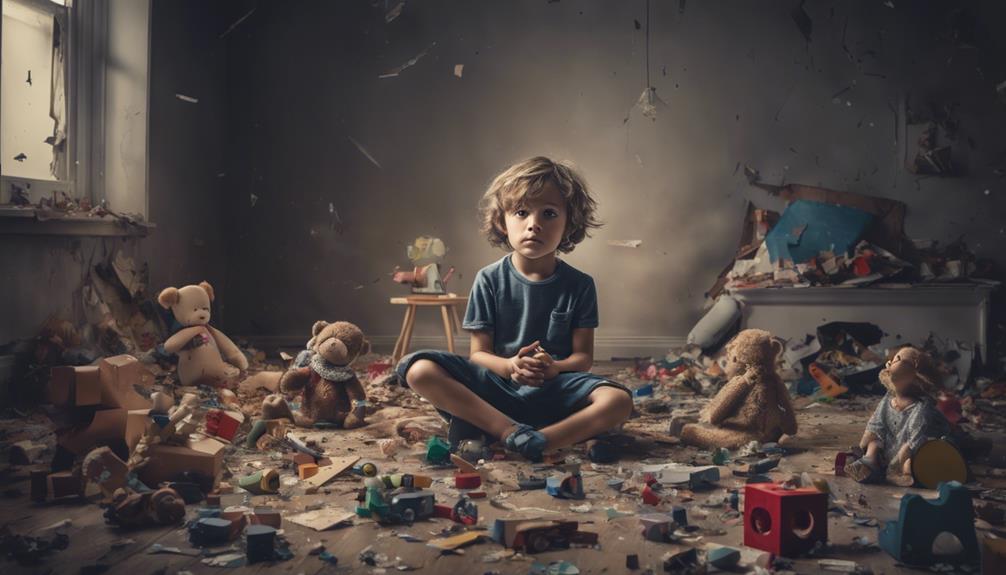
As someone who experienced their parents’ divorce growing up, I vividly remember feeling like a ship caught in a storm, being tossed back and forth between two different worlds without any sense of direction. Dr. Emery sheds light on the fallacy about children being resilient during divorce, revealing a truth that contradicts common beliefs.
The mention of this myth opens up a crucial discussion on the true impact of divorce on children, challenging us to reconsider what we thought we knew about their ability to bounce back.
Key Takeaways
- Children's resilience in divorce does not mean they quickly bounce back.
- Acknowledging children's post-divorce difficulties is crucial for providing support.
- Understanding the true impact of divorce on children's mental health is essential.
- Support, emotional acknowledgment, and strategies like mediation are vital for children's well-being post-divorce.
Common Misconceptions About Children and Divorce
In debunking common misconceptions about children and divorce, we shed light on the profound impact this experience has on young lives. The truth about children dealing with the emotions surrounding their parents' divorce is that it's far from easy.
Contrary to the myth of quick adaptation, children often struggle with the consequences of divorce, affecting their mental health and overall well-being. As parents navigating this challenging terrain, understanding the reality of how divorce impacts children is vital for fostering healthy family relationships and effective co-parenting.
By acknowledging the complexities of children's experiences during divorce, we can better support them through this turbulent time. Dr. Emery's insights challenge the notion that children effortlessly bounce back, emphasizing the importance of parental awareness and active involvement in their children's emotional journey.
Let's debunk the myths about children and divorce to create a more compassionate and understanding approach to parenting through separation.
Dr. Emery's Debunked Myths on Divorce Effects
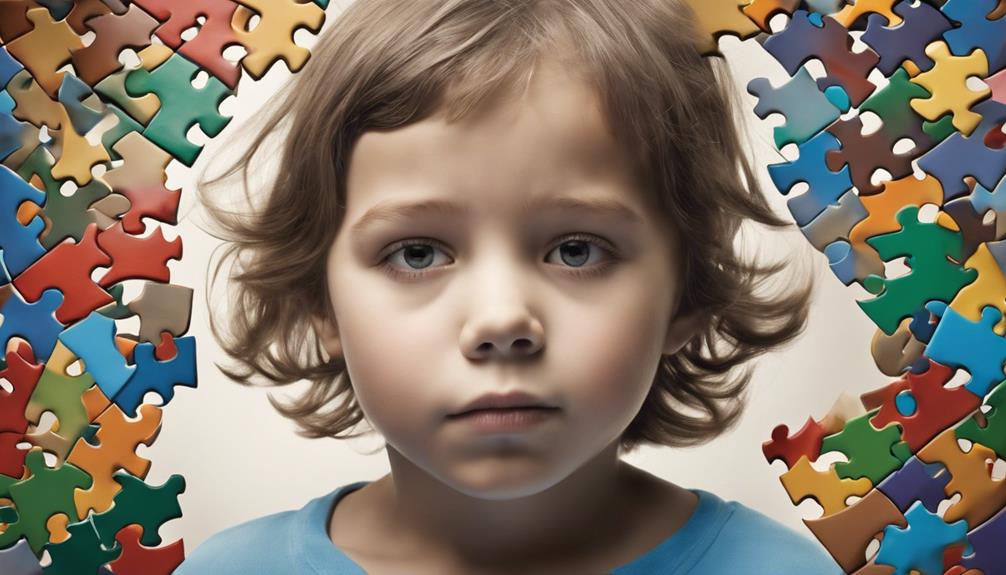
Debunking prevalent myths surrounding the impact of divorce on children, Dr. Emery sheds light on the profound emotional challenges they face during their parents' separation. It's a common misconception that children are naturally resilient and will easily adapt to their parents' divorce. However, Dr. Emery's work emphasizes that children are deeply impacted by their parents' separation and may struggle to deal with the changes in their family dynamic. The myth that children quickly bounce back from divorce is refuted by research, highlighting the significant impact it can have on their well-being. Acknowledging the difficulties children face when their parents are divorced is crucial in supporting them through this challenging time. Understanding the true extent of the impact divorce can have on children's lives helps us provide the necessary care and support they need to foster resilience.
| Dealing with Divorce | Impact on Children | Family Dynamics |
|---|---|---|
| Challenging emotions | Emotional distress | Changes in routines |
Addressing False Beliefs About Child Resilience
Addressing the misconception that children naturally bounce back from divorce without support is crucial for understanding their emotional needs during this challenging time. Dr. Emery challenges the myth of children's automatic resilience in the face of divorce, emphasizing that kids require understanding and guidance throughout the process.
Believing in this myth may lead to overlooking children's emotional needs post-divorce. It's essential to provide proactive parenting and support to help children navigate this difficult period. By debunking the idea that children will effortlessly recover from divorce, Dr. Emery highlights the importance of being attentive to their emotional well-being.
Parents and caregivers play a vital role in helping children cope with the changes and uncertainties that come with divorce. By offering the necessary support and understanding, we can help children build resilience and adapt positively to the challenges they face during and after a divorce.
Challenging Stereotypes on Children's Resilience

How do children's resilience in the face of divorce challenge common stereotypes? Dr. Emery's insights shed light on the misconceptions surrounding children's ability to bounce back effortlessly from their parents' divorce. While children can indeed show resilience, it's crucial to recognize that this doesn't imply they're unaffected by the situation.
The emotional well-being and developmental trajectory of children can be significantly impacted by the challenges divorce brings. By acknowledging the complexity of children's experiences during and after divorce, we can better support them through these turbulent times.
Dr. Emery's emphasis on the lasting effects of divorce on children's lives challenges the myth that they quickly recover from such emotional upheavals. It's essential to understand that although children may demonstrate strength in coping with divorce, their struggles are real and deserve attention.
Debunking Myths Surrounding Kids' Post-Divorce Well-Being
Children's well-being after divorce is often misunderstood, leading to harmful misconceptions about their emotional resilience. Dr. Emery debunks the myth that children easily bounce back from the pain of divorce, emphasizing that they're deeply affected by their parents' separation.
Despite common belief, most children express a desire for their parents to remain together. Divorce is portrayed as a significant life-changing event that has lasting impacts on children's mental health. Dr. Emery challenges the notion that children are inherently resilient to the effects of divorce, highlighting the need for a more nuanced understanding of their experiences.
Several factors, including legal and policy frameworks, child custody arrangements, children's exposure to parental conflict, and the quality of parenting plans, can influence post-divorce well-being. Strategies such as divorce mediation and fostering a healthy co-parenting relationship play crucial roles in mitigating the negative consequences of divorce on children.
Frequently Asked Questions
Which of the Following Does Dr Emery Mention Is a Myth About Children in Divorce?
It's important to understand that Dr. Emery challenges the misconception that children easily bounce back from divorce. He emphasizes the lasting impact on children, debunking the myth of resilience. Divorce significantly affects children.
Which of the Following Is True of How Parents Work Affects the Development of Their Children?
When parents work together positively, children's development flourishes. Our actions profoundly shape our children's growth. We must prioritize cooperation and emotional management to ensure our children thrive post-divorce.
What Is the Support That Parents Provide One Another in Raising a Child Together Called?
We call the support parents give each other in raising a child together co-parenting. It involves effective communication, cooperation, and prioritizing the children's needs. This approach can greatly benefit children's emotional health and resilience post-divorce.
When Working With at Risk Children With Low Self-Esteem It Is Important to Remember That Children Feel the Best About Themselves When?
When working with at-risk children with low self-esteem, it's vital to recognize that children feel the best about themselves when they receive genuine love, support, and encouragement consistently. Building them up with positivity is key.
Conclusion
In the intricate tapestry of children's lives, the myth of resilience in the face of divorce unravels before our eyes. Dr. Emery's insightful revelations challenge our preconceived notions and reveal the true impact of divorce on children.
Let's heed his words and strive to better understand the complexities of children's emotions during such tumultuous times. Only then can we truly support and nurture them through the stormy seas of divorce.
Sarah’s voice is one of the first you’ll encounter at How Get Divorce, and it’s one you’ll come to trust. As a writer, she brings relatability and approachability to complex topics, making them understandable for everyone. As our Community Moderator, Sarah fosters a welcoming and supportive environment, encouraging open dialogue and connection among our members. Her ability to relate to others and moderate discussions makes her an integral part of our team and community.




















